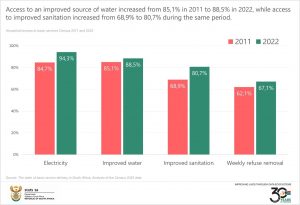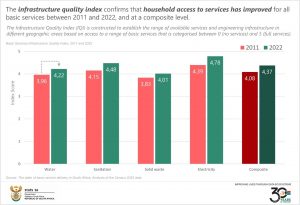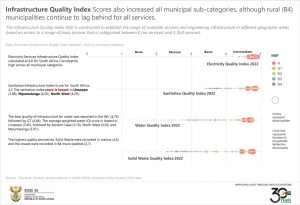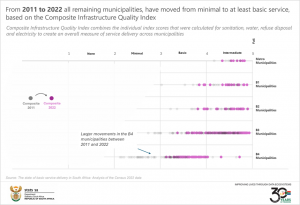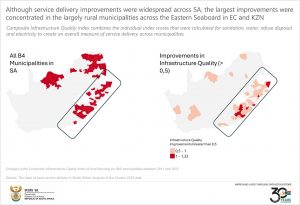A decade of progress in service delivery in South Africa
Between 2011 and 2022, access to essential services has improved, with Census data revealing that access to clean water has increased from 85,1% to 88,5%, and improved sanitation from 68,9% to 80,7% — underscoring a decade of progress in service delivery.
According to the report The State of Basic Service Delivery in South Africa: Analysis of the Census 2022 Data released by Statistics South Africa, weekly refuse removal increased by five percentage points to 67,1% by 2022, while access to electricity rose by 9,6 percentage points to 94,3%.
Service delivery refers to the provision of essential public services such as clean water, waste management, health care, education, and infrastructure development. Adequate access to safe water and sanitation is essential for life, well-being, and human dignity—key pillars of a higher quality of life. Providing these services is among the most effective strategies for reducing poverty and inequality.
As the driving force behind basic service delivery, local government is responsible for supplying essential services and promoting development by channelling economic resources to improve the lives of all citizens. While local municipalities often deliver these services directly, they also partner with community organisations or private entities through contracts or privatisation.
However, despite the improved progress in providing basic services over recent decades, access still varies widely within and between municipalities. This is due to differences in population size, level of economic development, and specific infrastructure needs. To measure this, the Infrastructure Quality Index (IQI) was created to assess the level of services and infrastructure across various regions. It uses a scale from 0 to 5, where 0 means no services are available and 5 means full services are provided.
The Infrastructure Quality Index shows that household access to all basic services improved between 2011 and 2022, with an overall increase in the index. The biggest improvement was in electricity access, which rose by 0,39 points to reach 4,78, followed by sanitation, which increased by 0,33 points to 4,48. The composite (combined) index for all services increased from 4,08 to 4,37 during this period. IQI scores increased in all municipal sub-categories, though rural (B4) municipalities still lag in all service areas.
An analysis of the Composite Infrastructure Quality Index scores, which combines individual scores for four basic services, reveals that all municipalities have progressed from minimal to at least basic service levels in all municipal sub-categories. While rural (B4) municipalities still have lower index scores, they saw the most significant improvements between 2011 and 2022.
While service delivery improvements were observed throughout the country, the most significant gains were concentrated in the predominantly rural municipalities along the Eastern Seaboard in the Eastern Cape and KwaZulu-Natal. These improvements were primarily driven by substantial increases in household access to electricity in the rural (B4) municipalities.
“The State of Basic Service Delivery in South Africa: An Analysis of Census 2022 Data” aims to examine and compare the provision of basic services—such as housing, water, sanitation, electricity, and solid waste—across provinces and local municipalities from 2011 to 2022. An Infrastructure Quality Index (IQI) is created based on access to these essential services to assess the availability of engineering infrastructure in different geographic regions and facilitate comparisons between 2011 and 2022.
While governments and institutions strive to meet their constituents’ needs, the challenges in maintaining effective service delivery remain complex.
For more information, download the full report here.


